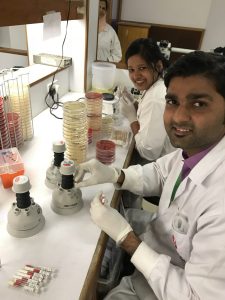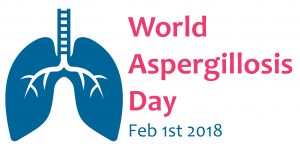Aspergillosis, lung and sinus disease caused by the fungus Aspergillus, affects around 15 million people and kills over 1 million each year. Announced today at the 8th biennial Advances against Aspergillosis international conference in Lisbon starting on February 1st, are the 5 aspirational targets for aspergillosis to be achieved by 2030:
- Survival in invasive aspergillosis increased to 90% (up from under 50%)
- Plugging the major gaps in our understanding of the biological, immunological and genetic basis of aspergillosis
- Diagnostics (most countries, including all of Africa have no diagnostic capability at all)
- New widely available, standardized and clinically validated diagnostics techniques
- New simple screening tests developed
- Treatment
- New antifungal agents licensed for invasive, chronic and allergic aspergillosis and for all age groups (only 3 classes currently available)
- At least one vaccine against aspergillosis in clinical trials or approved (none currently).
At the conference opening session, Professor David Denning, President of the Global Action Fund for Fungal Diseases (GAFFI) and Professor of Infectious Diseases in Global Health at the University of Manchester spoke on behalf of patients, doctors and researchers in calling for radical improvements. Because diagnostics are not available in so many countries, hundreds of thousands of people unknowingly die or are disabled by aspergillosis yet could be saved or cured. He said: “I have been looking after patients with aspergillosis for over 35 years, and yet we still lose patients and see too many people severely affected by this common fungus. I contributed to many clinical studies bringing the first effective oral drugs to patients (itraconazole and voriconazole), and yet the burden and deaths remains huge. Nothing less than a concerted international effort is required to address huge disparities in aspergillosis frequency.”
2018 marks the 20th anniversary of The Aspergillus Website, which the Fungal Infection Trust has been supporting. It provides a truly encyclopedic resource (>100,000 pages) and news feed to the world at no cost to the user, thanks to its many supporters over decades.
Together with its sister Website for Patients (www.nacpatients.org.uk), they attract over 1 million users per month, indicative of the need for information. In 2012, the Fungal Infection Trust launched a global educational website LIFE Worldwide, in English and Spanish, which is also highly utilised.
The Advances in Aspergillosis conference series (AAA), held alternate years, is the premier forum for detailed and dedicated discussion of all aspects of aspergillosis, attracting over 350 delegates from 35+ countries. Topical issues include: emergence of pan-azole and echinocandin resistance which requires unique approaches, new antifungal agents and immunotherapies for chronic and allergic aspergillosis, better molecular and low-cost strategies for diagnosis and publication of several recent clinical guidelines for clinicians offer detailed guidance. View video footage of the first day at AAA.
Other major needs for health improvements in aspergillosis include:
- Improvement in the public’s awareness of fungal diseases and specifically aspergillosis
- Keeping homes free from excessive Aspergillus and other moulds related to dampness, which increases the number and severity of asthma episodes
- Stronger evidence base of antifungal therapy allergic aspergillosis to reduce the number and severity of asthma episodes, and probably asthma deaths
- Hospital environments for vulnerable patients free of Aspergillus
- Reduction in azole resistance with reduced use of azole fungicides in non-essential crops
- Prevention of a new epidemic of resistance with any new classes of antifungal used for aspergillosis by not allowing such chemical class to be used as a fungicide
- Need for better surveillance and detailed epidemiology data
- Development of immunotherapies as well as vaccines

